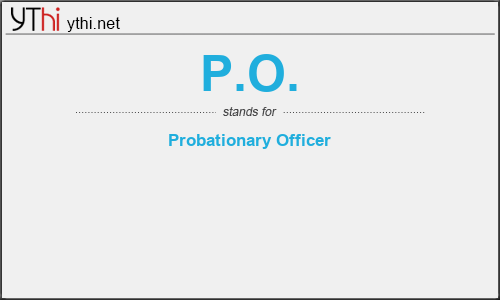What does P.O. mean? What is the full form of P.O.?
The full form of P.O. is Probationary Officer.
A probation officer is someone who works with and monitors offenders to prevent them from committing new crimes. They carry through with anything the court assigns to them, the most common being to supervise offenders and to investigate the offender’s history (personal and criminal) prior to sentencing.
Probation officers typically do the following:
- Evaluate offenders to determine the best course of treatment
- Provide offenders with resources to aid in rehabilitation
- Discuss treatment options with offenders
- Arrange treatment programs
- Supervise offenders and monitor their progress
- Conduct meetings with offenders as well as their family and friends
- Write reports on the progress of offenders
- Investigate offender’s history for the court
Probation officers work with offenders who are given probation instead of jail time, who are still in prison, or who have been released from prison. The following are types of probation officers and correctional treatment specialists:
-
Probation officers, who are called community supervision officers in some jurisdictions, supervise people who have been placed on probation. They work to ensure that the offender is not a danger to the community and to help in their rehabilitation. They write reports that detail each offender’s treatment plans and their progress since they were put on probation. Most probation officers work with either adults or juveniles. Only in small, mostly rural, jurisdictions do probation officers counsel both adults and juveniles.
-
Pre-trial services officers investigate an offender’s background to determine if that offender can be safely allowed back into the community before his or her trial date. They must assess the risk and make a recommendation to a judge who decides on the appropriate sentencing or bond amount. When offenders are allowed back into the community, pretrial officers supervise them to make sure that they stay with the terms of their release and appear at their trials.
-
Parole officers work with people who have been released from jail and are serving parole to help them re-enter society. They monitor post-release offenders and provide them with various resources, such as substance abuse counselling or job training, to aid in their rehabilitation. By doing so, the officers try to change the offenders’ behaviour and thus reduce the risk of that person committing another crime and having to return to jail or prison.
-
Correctional treatment specialists, who also may be known as case managers or correctional counsellors, counsel offenders and develop rehabilitation plans for them to follow when they are no longer in prison or on parole. They may evaluate inmates using questionnaires and psychological tests. They also work with inmates, probation officers, and staff of other agencies to develop parole and release plans. For example, they may plan education and training programs to improve offenders’ job skills.
The number of cases a probation officers handles at one time depends on the needs of offenders and the risks associated with each individual. Higher risk offenders usually command more of the officer’s time and resources. Caseload size also varies by agency.
Technological advancements—such as improved tests for screening drug use, electronic devices to monitor clients, and kiosks that allow clients to check in remotely—help probation officers supervise and counsel offenders.
P.O.
means
Probationary Officer![]()
Translate Probationary Officer to other language.


Leave a Reply
You must be logged in to post a comment.